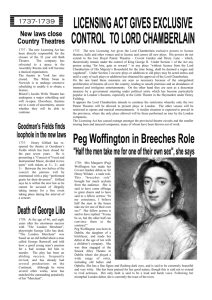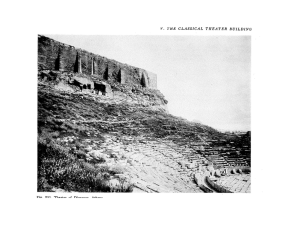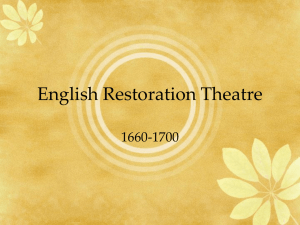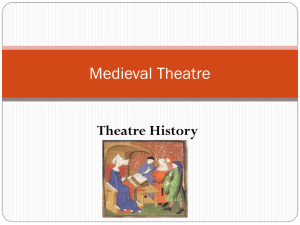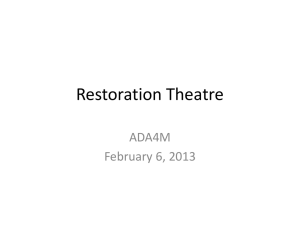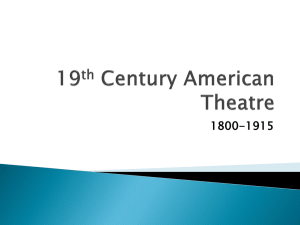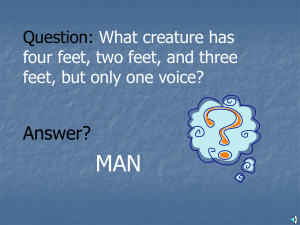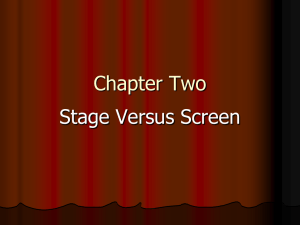George Bernard Shaw
advertisement
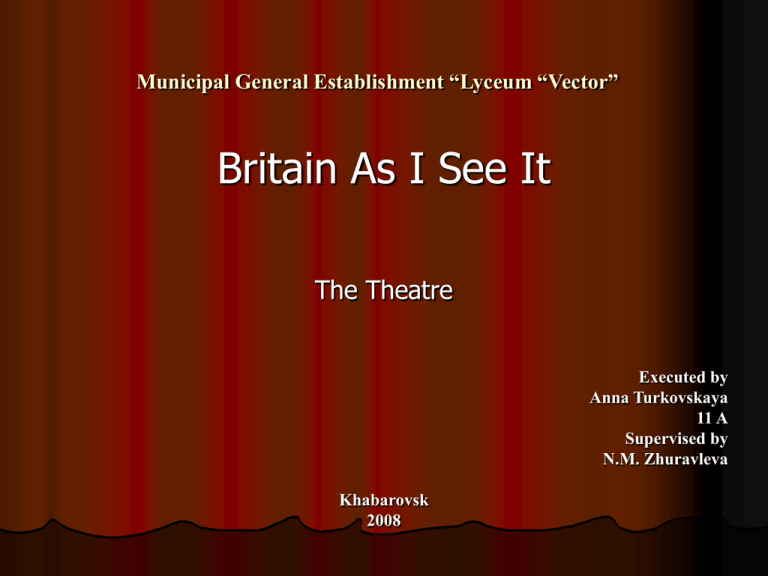
Municipal General Establishment “Lyceum “Vector” Britain As I See It The Theatre Executed by Anna Turkovskaya 11 A Supervised by N.M. Zhuravleva Khabarovsk 2008 Plan: • The Famous English Theatres - The Theatre Royal/Drury Lane - The Royal Opera House/Covent Garden - The National Theatre (NT) • The Greatest Of the English Dramatists - William Shakespeare - George Bernard Shaw - Oscar Wild The Famous English Theatres ► The Theatre Royal/Drury Lane The Theatre Royal, Drury Lane is theatre in Covent Garden, in the City of Westminster, a borough of London. The building faces Catherine Street and backs onto Drury Lane. The building standing today is the most recent in a line of four theatres at the same location dating back to of 1663, making it the oldest London theatre. For its first two centuries, Drury Lane could "reasonably have claimed to be London's leading theatre" and thus one of the most important theatres in the English-speaking world. Through most of that time, it was one of a small handful of patent theatres that were granted monopoly rights to the production of "legitimate" (meaning spoken plays, rather than opera, dance, concerts, or plays with music) drama in London. • The Royal Opera House/Covent Garden This theatre is situated near the former site of the Covent Garden Market in central London. It is the leading theatre of opera and ballet in London. The present building was opened in 1858 and is now the home of the Royal Opera (founded in 1946) and Royal Ballet (founded in 1931) companies. The theatre presents spectacular productions with international stars. The repertoire is classical. And this theatre is expensive. The top price for opera is £100 and for ballet £37. The National Theatre (NT) It took over the hundred years to establish a national theatre company. It's first director from 1962 was Lawrence Olivier. This is the first state theatre Britain has ever had. A special building for it was opened in 1976. It has three theatres in one: "The Oliver theatre", the biggest is for the main classical repertoire; "The Lyttilton", a bit smaller is for new writing and for visiting foreign countries and "The Cottesloe theatre", the smallest is used for experimental writing and productions. The Greatest Of the English Dramatists William Shakespeare William Shakespeare (26 April 1564 – 23 April 1616) was an English poet and playwright, widely regarded as the greatest writer in the English language. He is often called England's national poet. His surviving works consist of 38 plays, 154 sonnets, two long narrative poems, and several other poems. His plays have been translated into every major living language, and are performed more often than those of any other playwright. And his the most famous works are: “As You Like It”, “Hamlet”, “Othello”, “Romeo and Juliet”, “A Midsummer Night's Dream”, “King Lear”, “Macbeth”. His Quotations: "All the world's a stage, and all the men and women merely players: they have their exits and their entrances; and one man in his time plays many parts...“ As You Like It “To be or not to be: that is the question” “Hamlet” “There is nothing either good or bad, but thinking makes it so” “Hamlet” George Bernard Shaw George Bernard Shaw (26 July 1856 – 2 November 1950) was a world-famous Irish playwright. Shaw's first profitable writing was music and literary criticism, but he had a bent for drama: during his career he wrote more than 60 plays. An ardent socialist, Shaw wrote many brochures and speeches for the Fabian Society. He is the only person to have been awarded both the Nobel Prize for Literature (1925) and an Oscar (1938). These, respectively, were for his contributions to literature, and for his work on the film Pygmalion. His famous works: “Widowers' Houses ”, “Arms and the Man”, “Major Barbara”, “Pygmalion”, “You never can tell” etc. Oscar Wilde Oscar Fingal O'Flahertie Wills Wilde (October 16, 1854 – November 30, 1900) was an Irish playwright, novelist, poet, and author of short stories. Known for his barbed wit, he was one of the most successful playwrights of late Victorian London, and one of the greatest celebrities of his day. As the result of a famous trial, he suffered a dramatic downfall and was imprisoned for two years of hard labour after being convicted of the offence of "gross indecency." His famous works: “The Ideal Husband”, “Lady Windermere's Fan”, “A Woman of No Importance”, “The Importance of Being Earnest” etc. QUESTIONS: • Can you name three famous theatres I've told you about in this presentation? And what do you know about them? • Which plays by Shakespeare do you know? • How many plays George Bernard Shaw had written? • For How many tears Oscar Wilde had been imprisoned? The Sources of information: • The Internet: http://wikipedia.ru • “The World Of Britain”, Moscow, Versiya. Bogoroditskaya, Khrustalyova
